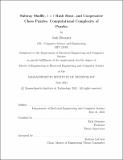| dc.contributor.advisor | Demaine, Erik | |
| dc.contributor.author | Brunner, Josh | |
| dc.date.accessioned | 2022-01-14T14:52:37Z | |
| dc.date.available | 2022-01-14T14:52:37Z | |
| dc.date.issued | 2021-06 | |
| dc.date.submitted | 2021-06-17T20:12:57.020Z | |
| dc.identifier.uri | https://hdl.handle.net/1721.1/139145 | |
| dc.description.abstract | Oriented Subway Shuffle is a game played on a directed graph with colored edges and colored tokens present on some vertices. A move consists of moving a token across an edge of the matching color to an unoccupied vertex and reversing the orientation of that edge. The goal is to move a token across a target edge. We show that it is PSPACE-complete to determine whether a particular target edge can be moved across through a sequence of Oriented Subway Shuffle moves. We show how this can be interpreted in the context of the motion-planning-through-gadgets framework, thus showing PSPACE-completeness of certain motion planning problems. In contrast, we show that polynomial time suffices to determine whether a particular token can ever move.
This hardness result is motivated by three applications of proving other puzzles hard. A fairly straightforward reduction shows that the puzzle game Rush Hour is PSPACE-complete when all of the cars are 1 × 1 and there are fixed immovable cars. We show that two classes of cooperative Chess puzzles, helpmates and retrograde Chess, are also PSPACE-complete by reductions from Oriented Subway Shuffle. | |
| dc.publisher | Massachusetts Institute of Technology | |
| dc.rights | In Copyright - Educational Use Permitted | |
| dc.rights | Copyright MIT | |
| dc.rights.uri | http://rightsstatements.org/page/InC-EDU/1.0/ | |
| dc.title | Subway Shuffle, 1 × 1 Rush Hour, and Cooperative Chess Puzzles: Computational Complexity of Puzzles | |
| dc.type | Thesis | |
| dc.description.degree | M.Eng. | |
| dc.contributor.department | Massachusetts Institute of Technology. Department of Electrical Engineering and Computer Science | |
| mit.thesis.degree | Master | |
| thesis.degree.name | Master of Engineering in Electrical Engineering and Computer Science | |
